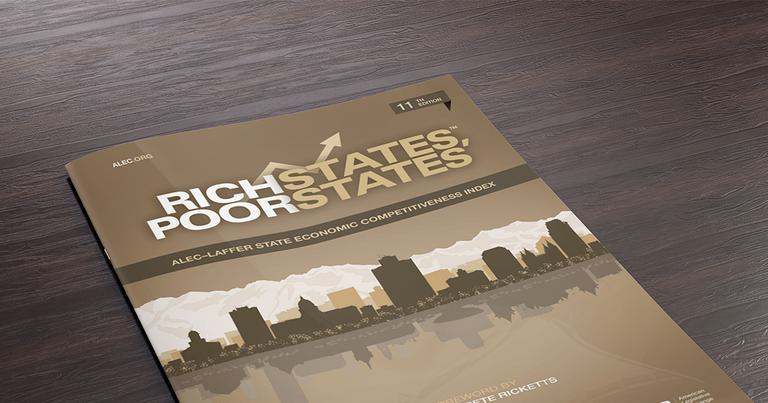
Budget & Tax
Curtis Shelton | April 24, 2019
Workers' comp success helps Oklahoma move up in economic ranking
Curtis Shelton
The American Legislative Exchange Council recently released its annual publication on state competitiveness, Rich States, Poor States. The report, written by Dr. Art Laffer, Stephen Moore, and Jonathan Williams, ranks each state on its economic competitiveness. The report gives each state two overall rankings: one is a backward-looking measure that looks at past economic performance, the other is a forward-looking measure on a state’s economic outlook.
This year Oklahoma was given the 13th spot in terms of economic competitiveness. This is three spots ahead of Oklahoma’s rank last year. While this may sound encouraging, the jump is mostly attributable to other states doing more harm to their own economic growth. Oklahoma ranked 46th when it came to recently legislated tax changes, having increased the tax burden by $5.69 per $1,000 of personal income over just the past two years.
Oklahoma’s tax laws have become less competitive, but another change has helped move the state into the top 15: workers’ compensation costs. Average workers’ compensation costs fell to $2.23 per $100 of payroll from $2.55, moving Oklahoma from 43rd in the country to 27th. Since 2013, when the legislature passed workers comp reform, the average cost has fallen from $2.77 to $2.23, a 20% reduction in cost. Despite this success, new legislation threatens to weaken workers comp reforms.
With Oklahoma moving up three spots it now holds the highest rank among its regional neighbors. Oklahoma this year jumps ahead of Texas, which moved down to 15th. Kansas continues to hold the last spot at 27th. Oklahoma’s move up to 13th was the biggest jump out of any regional states. Three states—Arkansas, Kansas, and Texas—moved down one spot from last year.

Curtis Shelton
Policy Research Fellow
Curtis Shelton currently serves as a policy research fellow for OCPA with a focus on fiscal policy. Curtis graduated Oklahoma State University in 2016 with a Bachelors of Arts in Finance. Previously, he served as a summer intern at OCPA and spent time as a staff accountant for Sutherland Global Services.